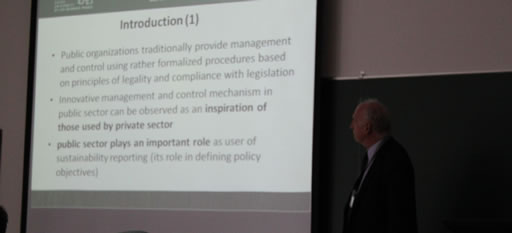Ve dnech 26.-27. března 2015 se konala ve španělském San Sebastianu v pořadí již 18. konference Evropského sdružení pro environmentální a udržitelné manažerské účetnictví (EMAN). Téma konference bylo účetnictví udržitelného rozvoje a řízení inovací. Vedle tohoto tématu se konference zaměřila na zkušenosti s reportingem udržitelného rozvoje.
Bylo předneseno celkem 44 příspěvků. Z významných osobností na konferenci vystoupili prof. Stephan Schaltegger z Centra pro udržitelný management na Leuphana University v Lüneburgu, prof. Roger Burritt z Macquarie University v Sydney, prof. Carlos Larrinaga z Centra pro výzkum v oblasti sociálního a environmentálního účetnictví ze španělské Burgos univerzity a prof Ramón Villacampa z univerzity Zaragoza, který je zaměřen na Společenskou odpovědnost podniků.
Příspěvky byly zaměřeny na problematiku managementu udržitelného rozvoje, vliv strategií udržitelného rozvoje na inovace, management udržitelného rozvoje na úrovni obcí, udržitelnost materiálových toků, zkušenosti s reportingem udržitelného rozvoje a úlohu zainteresovaných stran. Za Českou republiku vystoupil na konferenci doc. Ing. Miroslav Hájek, Ph.D. k problematice managementu udržitelného rozvoje a inovací u podniků vodovodů a kanalizací. Celkově lze konferenci hodnotit velmi kladně, a to z pohledu aktuálnosti zaměření i možnosti získání nejnovějších poznatků v projednávané oblasti.
V návaznosti na uvedenou konferenci se bude konat v říjnu letošního roku mezinárodní konference zaměřená na účetnictví udržitelného rozvoje, která bude pořádána Světovou podnikatelskou radou pro udržitelný rozvoj (WBCSD) a Evropským sdružením pro environmentální a udržitelné manažerské účetnictví (EMAN). Konference bude zaměřena na hodnocení udržitelnosti u podniků, zejména v oblasti environmentální a sociální. Předpokládá se podrobná diskuse s omezeným počtem účastníků. Bližší informace lze nalézt na stránkách http://www2.leuphana.de/umanagement/projekte/eman/geneva-201. Za Českou republiku bude účast organizována Českou podnikatelskou radou pro udržitelný rozvoj.
Stručný výtah článku (anglicky)
Sustainable management and innovation in public water supply and sewerage sector on the example of the City of Prague
Miroslav Hájek, Lubomír Petružela, Marie Kubáňková, Jaroslava Hyršlová
Sector of public services in the field of drinking water supply and sewage disposal integrates economic (profitability, profit), environmental (pollution reduction, polluter pays) and social (access to services, health quality) principles and methods. Corporate strategies of operators are focused on complex solution taking into account aspects of sustainable development. The strategy framework in this area is defined by traditional instruments of the government such as regulation of natural monopolies, the application of European environmental and health standards, and municipalities as owner of technical infrastructure (the organizer of public tenders and recipient of grants) and guarantor of acceptability of quantity, quality and price of service for citizens. The principles of sustainability and the use of innovative investment to optimize costs, price, quality of service and control of discharged residual pollution set very high requirements for innovation, its management and implementation in the sector. Economic analysis using sustainability accounting principles can indicate how the operating company uses innovation to achieve cost savings and profit, while sharing within the regulated price this benefit with the consumer and creating socially significant environmental and social benefits.
The paper aims to analyze the management methods of water supply and sewerage companies respecting the principles of sustainable development and the related innovative investment opportunities in the conditions of natural monopoly and state regulation. The paper further analyzes the most important aspects of sustainable management of water supply and sewerage companies in the context of the current way of government regulation. Economic results, environmental and social impacts of management and assessment of innovative investment are described on the example of the City of Prague.
It is the largest system in the Czech Republic, responsible for the production and distribution of drinking water, sewerage and waste water treatment for 1.26 million of people living in the City of Prague. Its operator, Water Supply and Sewerage Company of the City of Prague manages the property of the association of owners of Želivka water source and operates water treatment plants in Káraný and Podolí and distribution networks owned by the City of Prague. Densely built-up area in the city generally reduces units costs per m3, on the other hand, the concentration of infrastructure and special conditions increase the costs of its maintenance, refurbishment and modernization. Water and sewage tariff in the amount of CZK 74.8 per m3 of drinking and sewage water in 2014 is below the national average, but to maintain it in the case of major innovative investments in the quality of water supply (e.g. construction of a new control room) and in particular reconstruction and extension of the Central Waste Water Treatment Plant (to meet the requirements of Directive 91/271 EC), it is a difficult task. The paper roughly analyzes possible solution options in relation to costs, the impact on water and sewage tariffs while maintaining high social and achieving environmental standards.
 Cs
Cs